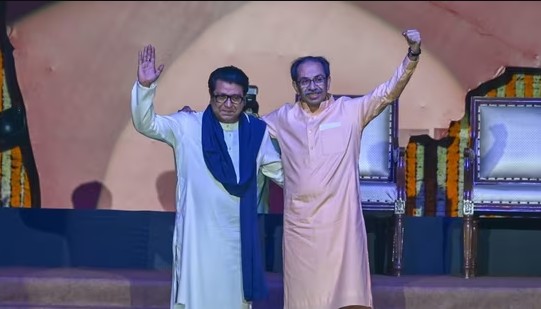
Shiv Sena leader Uddhav Thackeray and Maharashtra Navnirman Sena chief Raj Thackeray reunited after two decades, as the two regional parties united in response to the ongoing three-language controversy on Saturday. The alliance was announced to mark the Maharashtra government’s decision to rollback the three-language policy implemented in primary schools, signaling a significant shift in their stance.
This reunion of the Thackeray brothers also holds strategic importance ahead of the upcoming local elections in Maharashtra. Both parties—Shiv Sena UBT and Maharashtra Navnirman Sena—are known for their emphasis on the Maratha community’s identity and language, and their alliance signals a unified front in addressing regional and linguistic issues.
#WATCH | Mumbai: Brothers, Uddhav Thackeray and Raj Thackeray share a hug as Shiv Sena (UBT) and Maharashtra Navnirman Sena (MNS) are holding a joint rally as the Maharashtra government scrapped two GRs to introduce Hindi as the third language.
(Source: Shiv Sena-UBT) pic.twitter.com/nSRrZV2cHT
— ANI (@ANI) July 5, 2025
The reunion emerged amidst the ongoing dispute over the three-language policy introduced by the Central government, which has sparked widespread protests and debates across Maharashtra. By coming together, Uddhav Thackeray and Raj Thackeray aim to strengthen their political position and reinforce their regionalist agenda in the face of national policies they oppose.
This alliance underscores the shared concerns of both parties regarding the preservation of Marathi language and identity, especially in the context of the national language policies. Their united stance ahead of the elections signals an intention to consolidate their influence and appeal to their voter base centered around regional pride and linguistic issues.
Overall, the reunion of the Thackeray brothers is a significant political development in Maharashtra, highlighting their collective response to the central government’s policies and their preparedness for the upcoming electoral battles. It also reflects the continued importance of regional identities and linguistic pride in Maharashtra’s political landscape.
